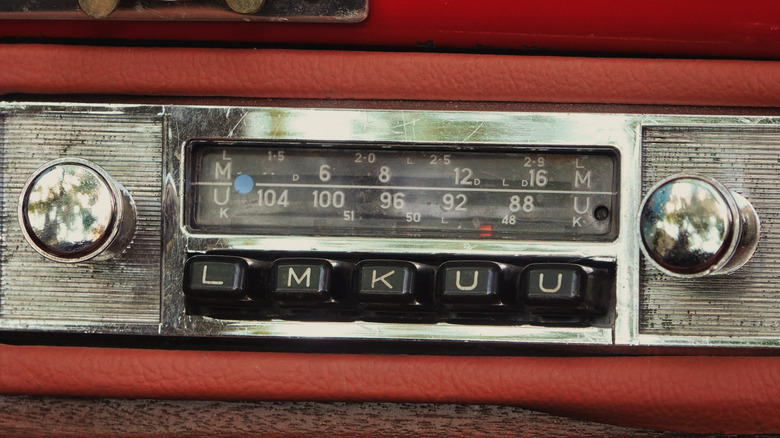The Reason Why Electric Cars Are Being Forced To Abandon AM Radio
As automakers are moving toward an increasingly electrified future — with EVs expected to represent more than half of all car sales worldwide by 2035 — a considerably older and fading technology is being abandoned: AM radio. In a recent survey of 20 manufacturers, eight of them have removed AM radio from their electric vehicles, including heavyweights like BMW, Tesla, and Volkswagen.
The reason most often cited isn't an inherent bias against terrestrial radio, but rather, an EV's electric motors can cause interference to AM frequencies, creating background noise and poor reception. BMW recently made a statement that it's choosing to omit AM receivers from its EVs "rather than frustrate customers with inferior reception and noise."
In some camps, signal interference is viewed as merely an excuse. According to the New York Times, experts say that the problem is "not insurmountable. Electromagnetic interference could be controlled with shielding cables, filters, and careful placement of the electrical components in the vehicle."
To wit, Stellantis (parent company of Dodge, Ram, and others) is relocating the radio receiver further away from electrical propulsion components, while at the same time adding electromagnetic shielding. Volkswagen, however, has voiced opposition to such measures, citing increased cost and weight, which will reduce range.
Sound reasoning exists both for and against nixing AM radio
Conventional radio listenership is in decline due to alternatives like satellite radio and music streaming services. Even if you're an FM radio fan, you probably haven't tuned in to any AM counterparts recently, so why is it important enough for some lawmakers to support a bipartisan bill called the AM Radio for Every Vehicle Act? The reason is safety.
Amplitude modulation (AM) frequencies travel much further than FM, and have long been considered the de facto platform for distributing information during natural disasters and emergencies. According to AM radio executive Jerry Chapman, "When the power goes out and cell networks are down, the car radio is often the only way for people to get information, sometimes for days at a time."
Automaker Ford initially removed AM service from its 2023 F-150 Lightning and Mustang Mach-e after data showed that fewer than 5% of its customers listened to it. Interestingly, the company also removed AM radio from its gasoline-powered 2024 Mustang, so more than just frequency interference led to the initial decision. Ford later recanted and is restoring AM service to all three vehicles, according to CEO Jim Farley.
After speaking with policy leaders about the importance of AM broadcast radio as a part of the emergency alert system, we've decided to include it on all 2024 @Ford & @LincolnMotorCo vehicles. For any owners of Ford EVs without AM broadcast capability, we'll offer a software...
— Jim Farley (@jimfarley98) May 23, 2023
Automakers that aren't willing to reverse course are quick to point out that consumer preferences for getting news and information are shifting. According to the rating firm Nielsen, terrestrial radio reaches 92% of the population, but text messaging is rapidly catching up, with 80% of North America's population using the technology.

